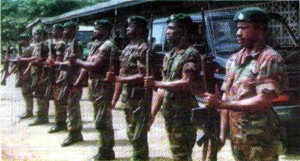|
Press Clippings
Reserves Called out
 Members of the National Reserves, like
these from the
Third Battalion of the Jamaica Regiment, have been called out for duties. The Jamaica Defence Force (JDF) last night called out the entire National Reserves, apparently in a move to bolster the numbers of soldiers available for duty ahead of a fresh attempt by the beleaguered security forces to launch another attack against rising crime in the country. In its call out notice last night, the JDF instructed all active members of the reserves — infantry, air wing and coast guard — to report for duty at their respective headquarters by 7:30 tomorrow. The call-up is for a month, stretching up to November 9. “All members of the first class of the National Reserve are required by law to report for duty for the period specified,” the army headquarters said in a statement. “The Jamaica Defence Force thanks all employers for their understanding and co-operation in making available for national duty all military personnel in their employment.” The reserves are largely weekend soldiers, but last night the JDF’s public information officer. Captain Charlene Steer could not say how many active members there were. Neither would she speculate on the reason for the call-up, which was not mentioned in the statement. However, the 3,000-member JDF and the 7,000-member police force have been under increased pressure in recent months in the face of an outbreak of violence in several sections of Kingston that has severely stretched their resources. Much of the violence is widely held to be related to politics and there are fears that the situation could worsen as the island comes closer to a general election, expected towards the end of next year. But the bulk of Jamaica’s violence, which has already cost nearly 900 lives this year, is the result of squabbles between gangs mostly in inner-city communities, the protection of drug turf and domestic disputes between poor, under-educated young men. “We are severely stretched by the incessant crime and violence,” a senior police officer conceded Tuesday at the scene of the murder of Corporal Michael Sutherland, the 12th police officer to have been killed this year. Sutherland, 32, was shot dead at his home at Federal Road, in the lower Barbican area, near Grants Pen in Kingston. Jamaican commentators have increasingly branded the kind of violence in the country as terrorism, fuelled in part by the narcotics trade, and yesterday a number of legislators agreed on the need for specific legislation dealing with terrorism. “The agreement is that we move urgently to bring the passage of appropriate legislation aimed at terrorism (and) that we develop an anti-terrorism bill to be considered by Parliament,” the national security minister, K D Knight, said at a sitting of a parliamentary committee reviewing a bill to make wiretaps and other communication intercepts legal in specific circumstances. One of those circumstances is in the case of terrorism which the bill defines as “any act involving the use of violence by a person, which, by reason of its nature and extent, is calculated to create a state of fear in the public or any section of the public”. But Professor Trevor Munroe felt that definition was narrow and said there was an urgent need for “statute, which embraces a broader definition of terrorism”. It has become, over the past two decades, almost the norm for JDF soldiers to patrol with the police in the toughest inner-city communities, but in July during widespread unrest after the West Kingston violence, Prime Minister P J Patterson announced that he had triggered Section 9 of the Defence Act, allowing for the deployment of the army with similar powers to the police. The aim, the government said at the time, was for the JDF to concentrate on the enforcement of curfews and cordons freeing the police for other crime fighting work. Additionally, the JDF was to have engaged in “rigorous search in any area where there is reason to believe illegal weapons and ammunition are held, stored or hidden”. Security analysts say that part of the problem facing the JDF has been its inability to make the its members available for this kind of security work in the numbers expected. For more than a year and a half, for instance JDF soldiers have been providing the bulk of security at the islands prisons after the government suspended nearly 800 prison warders who had gone on what the administration saw as an illegal strike, in breach of the essential services law. |